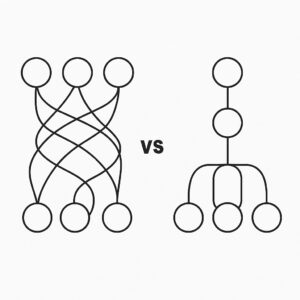I’m racking my brain for how to explain the difference between:
- Updating a bunch of different variables every time a bunch of different events happen, versus…
- Defining the relationships between those variables and letting them automatically update whenever their dependencies change.
What are these patterns called?
Initially, I called it “event-driven” vs “state-driven” variables, but that feels wrong because both are based on events and state.
State Management and Other Patterns
All of this falls under the umbrella of state management, but I haven’t found a really good resource on what “state management” means, its history, patterns, etc. All the top search results basically say “look at React/Redux”.
If I look back at the classic design patterns, two stick out:
Observer feels close, but what I’m really looking for is something more like “derived state” or “computed variables”—something that focuses on defining the relationship between variables, on dependencies.
Example Code
I still feel like I’m missing a way to describe the difference between these two chunks of code (using Vue 2 syntax):
| Version 1 | Version 2 |
|---|---|
|
|
Version 1 is how most developers would naturally approach the problem. It’s simple, procedural, makes sense.
Version 2 is more complex, but it gets ahead of the problem where adding more variables and more events becomes more and more complicated to manage. (Note: complex != complicated.)
🤷♂️ I’m still looking for a good why to describe this difference.
If y’all have any ideas, let me know!
